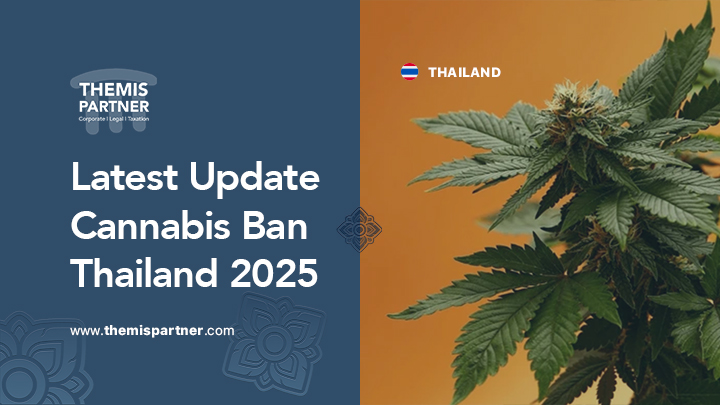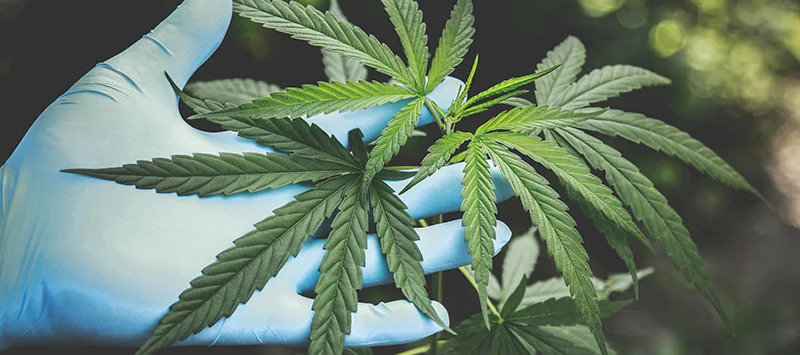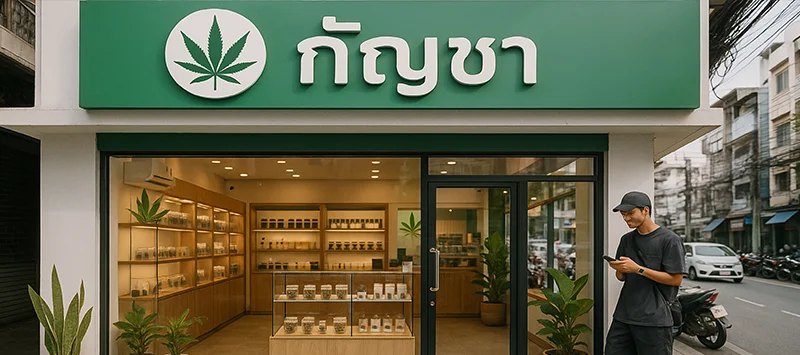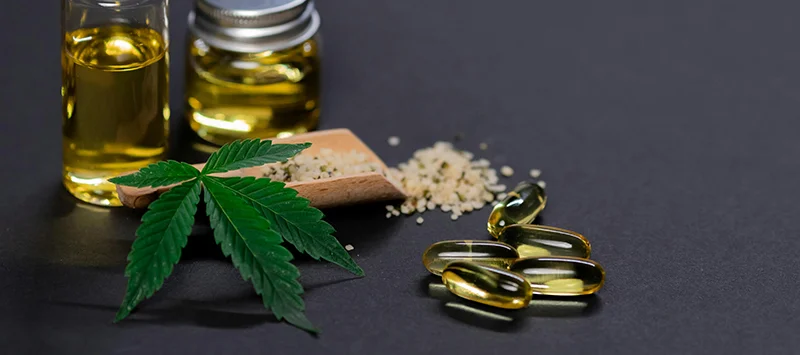As of June 2025, Thailand Cannabis Law officially limits all cannabis use to strictly defined medical cases, cutting off the thriving recreational market that briefly emerged. Every prescription, business, and traveler must now meet a higher standard: local documentation, licensed providers, and proven compliance at every step, or risk prosecution.

Curious how the reset impacts your business, travels, or health choices? Understanding the specific boundaries of Thailand Cannabis Law is essential to protecting your freedom, reputation and investments.
Key Takeaways
- Medical cannabis is legal in Thailand only with a Thai-issued prescription from a licensed doctor, dentist, pharmacist, or traditional practitioner, and all recreational use is strictly prohibited.
- CBD products are permitted only if they contain less than 0.2% THC, with any product above this threshold legally classified as a narcotic subject to criminal penalties.
- GACP certification is now mandatory for all cannabis cultivation and sale, and every gram must be fully traceable with meticulous record-keeping.
- On-site licensed medical professionals are required at every legal clinic or dispensary, and all sales must be linked to valid, in-person prescriptions.
- Online sales, advertising, and on-site consumption are strictly banned, with clinics required to report and document all transactions monthly to Thai authorities.
- Foreign-issued medical prescriptions are never recognized; tourists and foreign residents must not possess, purchase, or consume cannabis under any circumstances.
- Violations trigger severe penalties, including fines up to 25,000 Baht, license suspension, jail sentences up to one year, and immediate business closure for noncompliance.
- Businesses face active inspections and swift enforcement, so strict adherence to documentation, certification, and venue rules is critical for legal operation.
Table of Contents
-
Thailand Cannabis Law 2025: What Is Legal and What Is Not?
-
Medical Cannabis Regulations: Access, Prescriptions and Approved Uses
-
Cultivation, Distribution and Business Compliance in 2025
-
Penalties, Enforcement and Risks for Violations
-
Stakeholder Implications: Tourists, Residents and the Cannabis Industry
-
FAQ: Thailand Cannabis Law 2025
-
Conclusion
Thailand Cannabis Law 2025: What Is Legal and What Is Not?
In June 2025, Thailand Cannabis Law allows cannabis strictly for medical use under regulated conditions. All recreational cannabis activities, from possession to sales, are illegal and carry significant penalties under updated Thai drug laws.
Residents, professionals and tourists must follow these key restrictions:
- Medical cannabis requires a Thai-issued prescription and purchase from a licensed dispensary.
- All recreational use or possession is now prohibited, regardless of quantity or setting.
- Public cannabis consumption is banned, with fines up to 25,000 Baht and possible jail time.
- Only GACP-certified growers can supply dispensaries, and all business records are tightly controlled.
Thailand’s return to a medical-use-only policy ranks among Asia’s strictest. Even accidental recreational use can trigger prosecution and financial penalties.
Permitted vs. Prohibited Activities
| Activity | Medical | Recreational |
|---|---|---|
| Possession | Yes, by prescription | No |
| Purchase | Yes, licensed dispensary | No |
| Private Consumption | Yes, with valid documents | No |
| Public Consumption | No | No |
| Cultivation (Commercial) | Yes, with GACP | No |
Source: Thai FDA
To avoid penalties, keep cannabis documentation on hand at all times and never consume in public.
The new rules require due diligence from business owners, compliance for medical patients, and heightened caution for travelers. A single misstep, such as buying from a non-licensed source can result in prosecution. The clear line between permitted and prohibited activities empowers readers to act within the law.

Medical Cannabis Regulations: Access, Prescriptions and Approved Uses
To access medical cannabis legally under Thailand Cannabis Law in 2025, patients must secure a prescription from a Thai-licensed healthcare provider and purchase only from regulated dispensaries.
A valid prescription requires:
- Review by a Thai-licensed doctor, dentist, pharmacist, or approved traditional medicine practitioner
- List of 15+ approved medical conditions, such as cancer, chronic pain, epilepsy, and depression
- Maximum 30-day usage per prescription, with dosage and form clearly documented
Foreign-issued prescriptions are explicitly not recognized. Attempting to use one or bypassing the Thai prescription process places individuals at significant legal risk.
Who Can Prescribe and Dispense Medical Cannabis?
Thailand marijuana regulations allow these professionals to prescribe or dispense:
- Thai-licensed medical doctors and dentists
- Registered pharmacists
- Certified traditional and alternative medicine practitioners
Dispensaries must:
- Verify prescriptions and patient identity
- Record all sales, including quantity and form, using official recordkeeping forms
- Source only GACP-certified products
Detailed guidelines can be found via the Department of Thai Traditional and Alternative Medicine.
Special Rules on Cannabis Extracts and High-THC Products
Thai cannabis legislation defines:
- “Cannabis extracts” as products (oils, tinctures, edibles) with over 0.2% THC
- Only authorized providers may prescribe extracts, with strict limits on quantities
Possession of more than 30 grams (or milliliters for liquids) may be charged as intent to distribute, carrying criminal penalties.
Strict documentation, proper sourcing, and approved provider verification remain critical for legal compliance under Thailand drug laws 2025.
Cultivation, Distribution and Business Compliance in 2025
Commercial cannabis cultivation in Thailand requires strict compliance with the Good Agricultural and Collection Practices (GACP) standard, issued exclusively by the Department of Thai Traditional and Alternative Medicine (DTAM).
Cannabis flowers cannot be sold, exported, or processed unless traceable to a DTAM-certified GACP grower, with documentation required at every step.
Key compliance mandates include:
- GACP certification (valid for three years, issued in 90–180 days)
- Only DTAM-issued GACP accepted (not third-party certificates)
- Mandatory supply chain traceability and monthly Phor.Tor.27 record submissions
Small growers often face significant obstacles:
- High certification costs and bureaucracy
- Difficulty meeting ongoing inspection and recordkeeping requirements
- Limited access to distribution channels, risking closure or going underground
Every dispensary must guarantee its entire supply is GACP-certified and fully traceable, or face penalties.
Before selling cannabis, make sure to read: How To Launch a Cannabis Business in Thailand 2025
How Do GACP Certification and Record-Keeping Work?
The GACP process involves on-site inspections, cultivation review, and compliance training, with certification valid for three years.
Both growers and dispensaries must submit monthly inventories using the Phor.Tor.27 form, maintaining traceability for all cannabis sold or transferred.
For official GACP requirements, see WHO GACP guidelines.
What Are the Rules for Selling and Exporting Medical Cannabis?
Only licensed dispensaries and GACP-certified exporters may sell or ship cannabis, and all transactions must be documented.
Key rules to follow:
- Selling unlicensed or non-GACP cannabis is a punishable offense
- Exports require full documentation, or Customs can seize shipments
- Smuggling or forged documentation may result in severe penalties
Cannabis businesses navigating Thailand marijuana regulations in 2025 must focus on transparent recordkeeping and strict sourcing, ensuring sustainable operations in a tightly governed market.

Penalties, Enforcement and Risks for Violations
Penalties under Thailand Cannabis Law 2025 are among Asia’s strictest. Unlicensed cannabis possession or sales now result in immediate criminal charges, with penalties including jail and fines up to 25,000 Baht (approximately $700 USD) for public use.
Police routinely conduct checks on dispensaries, street vendors, and individuals. All cannabis not tied to a medical prescription or certified origin is subject to seizure, and Customs has intensified efforts against smuggling and unauthorized exports.
Types of Violations and Typical Penalties
- Unlicensed possession: Up to 1 year imprisonment and fines
- Illegal sales: Criminal prosecution, business closure, and blacklisting
- Public use: Up to 3 months jail or a 25,000 Baht fine
- Smuggling: Immediate seizure, further investigation, prosecution
Residents, tourists, and business owners face serious legal and financial risks if found outside the tightly regulated medical framework.
How Are Public Use and Advertising Controlled?
All public cannabis consumption is banned. Offenders risk arrest, especially near schools or temples. Marketing via social media is also strictly prohibited, with authorities monitoring online and physical ads.
Tourists must keep prescriptions and proof of purchase from licensed dispensaries at all times. Avoid accidental violations by consulting the Thai Public Health Ministry for updated rules.
Thailand’s cannabis regulations now operate on a zero-tolerance model: If in doubt, do not risk unlicensed possession anywhere in the country. Businesses and visitors must prepare for ongoing enforcement, evolving controls, and potential changes to penalties ahead.
Stakeholder Implications: Tourists, Residents and the Cannabis Industry
Thailand Cannabis Law in 2025 sets strict boundaries for tourists, locals, and business operators: only medical use is permitted, and every step must be documented and defensible.
Tourists should note: recreational use is punishable, public smoking brings steep fines, and only Thai-issued prescriptions are valid.
Residents and industry entrepreneurs face heightened requirements:
- Licensed sellers must trace every cannabis flower to GACP-certified sources
- Individuals using medical cannabis need legal proof at all times
- Business owners must maintain rigorous records and risk closure if non-compliant
Bringing or using cannabis without clear local documentation can quickly lead to fines or criminal charges, is a critical warning for all visitors and operators.
Economic Impact: Medical Tourism and the New Healthcare Revenue Streams
Leading hospitals and clinics are pivoting, now targeting patients seeking approved treatments for conditions like cancer, chronic pain, and epilepsy.
Recent estimates show medical tourism for cannabis-related care may grow 10 to 15 percent within the next year, but only for services strictly within the law (TAT Newsroom).
Tighter Thailand marijuana regulations may slow entrepreneurial opportunities, yet they are expected to boost confidence in healthcare quality and safety.
For all stakeholders: a careful, strategic approach and a clear understanding of Thai cannabis legislation will be the difference between legal certainty and unnecessary risk.

FAQ: Thailand Cannabis Law 2025
Thailand Cannabis Law in 2025 creates significant new rules for residents, tourists, and businesses. Here are answers to the most common questions, designed for quick reference and immediate action.
What Should Tourists and Foreign Residents Know First?
Foreigners cannot legally bring, use, or possess cannabis in Thailand, even with prescriptions from other countries. Strict entry checks and enforcement apply at all borders.
Key compliance requirements for visitors and foreign residents include:
- No recreational cannabis access under any circumstance
- Only Thai-issued prescriptions (by approved doctors or practitioners) are valid
- Foreign-issued prescriptions are not honored by Thai authorities or clinics
Is CBD Oil Legal, and What Are the Limitations?
CBD products are legal for personal use but only if the THC content is under 0.2 percent and intended for medical reasons.
Permitted forms include:
- Registered CBD oils, capsules, and extracts
- Products bought from licensed Thai medical cannabis clinics
- No recreational sales or off-label use, regardless of packaging claims
Statistics from the Thai FDA as of June 2025 confirm that products exceeding 0.2 percent THC are classified as narcotics and can trigger criminal prosecution.
Business Compliance: What Are the Essential Steps?
Businesses wishing to participate in Thailand’s regulated cannabis sector must comply with strict controls:
- Obtain Good Agricultural and Collection Practice (GACP) certification for all cultivated cannabis
- Hire licensed medical professionals (doctors, pharmacists, or traditional practitioners) on-site
- Report all transactions, maintain meticulous records, and pass regular government inspections
- Prohibit online sales, on-site consumption, and retail activity near prohibited venues (temples, schools, parks)
Noncompliance is costly: Recent enforcement included closure of dozens of noncertified dispensaries in Bangkok and daily fines reaching up to 25,000 Baht per violation.
Conclusion
Thailand’s 2025 cannabis law offers clarity and strict pathways for compliant medical use, empowering you to make confident decisions whether you’re seeking safe treatment, running a business, or visiting the country.
If you need tailored legal guidance, regulatory support, or help interpreting the latest requirements, contact us. Themis Partner provides expert, actionable advice to help you safeguard your interests and seize compliant opportunities in Thailand’s evolving cannabis market.
